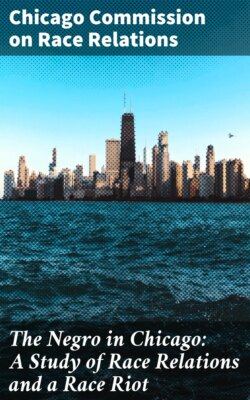Читать книгу The Negro in Chicago: A Study of Race Relations and a Race Riot - Chicago Commission on Race Relations - Страница 6
На сайте Литреса книга снята с продажи.
THE PROBLEM
ОглавлениеTable of Contents
The relation of whites and Negroes in the United States is our most grave and perplexing domestic problem. It involves not only a difference of race—which as to many immigrant races has been happily overcome—but wider and more manifest differences in color and physical features. These make an easy and natural basis for distinctions, discriminations, and antipathies arising from the instinct of each race to preserve its type. Many white Americans, while technically recognizing Negroes as citizens, cannot bring themselves to feel that they should participate in government as freely as other citizens.
Countless schemes have been proposed for solving or dismissing this problem, most of them impracticable or impossible. Of this class are such proposals as: (1) the deportation of 12,000,000 Negroes to Africa; (2) the establishment of a separate Negro state in the United States; (3) complete separation and segregation from the whites and the establishment of a caste system or peasant class; and (4) hope for a solution through the dying out of the Negro race. The only effect of such proposals is to confuse thinking on the vital issues involved and to foster impatience and intolerance.
Our race problem must be solved in harmony with the fundamental law of the nation and with its free institutions. These prevent any deportation of the Negro, as well as any restriction of his freedom of movement within the United States. The problem must not be regarded as sectional or political, and it should be studied and discussed seriously, frankly, and with an open mind.
It is important for our white citizens always to remember that the Negroes alone of all our immigrants came to America against their will by the special compelling invitation of the whites; that the institution of slavery was introduced, expanded, and maintained in the United States by the white people and for their own benefit; and that they likewise created the conditions that followed emancipation.
Our Negro problem, therefore, is not of the Negro's making. No group in our population is less responsible for its existence. But every group is responsible for its continuance; and every citizen, regardless of color or racial origin, is in honor and conscience bound to seek and forward its solution.
Centuries of the Negro slave trade and of slavery as an institution have created, and are often deemed to justify, the deep-seated prejudice against Negroes. They placed a stamp upon the relations of the two races which it will require many years to erase. The memory of these relations has profoundly affected and still affects the industrial, commercial, and social life of the southern states.
The great body of anti-Negro public opinion, preserved in the literature and traditions of the white race during the long, unhappy progress of the Negro from savagery through slavery to citizenship, has exercised a persistent and powerful effect, both conscious and unconscious, upon the thinking and the behavior of the white group generally. Racial misunderstanding has been fostered by the ignorance and indifference of many white citizens concerning the marvelous industry and courage shown by the Negroes and the success they have achieved in their fifty-nine years of freedom.
The Negro race must develop, as all races have developed, from lower to higher planes of living; and must base its progress upon industry, efficiency, and moral character. Training along these lines and general opportunities for education are the fundamental needs. As the problem is national in its scope and gravity, the solution must be national. And the nation must make sure that the Negro is educated for citizenship.
It is of the first importance that old prejudices against the Negroes, based upon their misfortunes and not on their faults, be supplanted with respect, encouragement, and co-operation, and with a recognition of their heroic struggles for self-improvement and of their worthy achievements as loyal American citizens.
Both races need to understand that their rights and duties are mutual and equal, and that their interests in the common good are identical; that relations of amity are the only protection against race clashes; that these relations cannot be forced, but will come naturally as the leaders of each race develop within their own ranks a realization of the gravity of this problem and a vital interest in its solution, and an attitude of confidence, respect, and friendliness toward the people of the other race.
All our citizens, regardless of color or racial origin, need to be taught by their leaders that there is a common standard of superiority for them all in self-respect, honesty, industry, fairness, forbearance, and above all, in generous helpfulness. There is no help or healing in appraising past responsibilities, or in present apportioning of praise or blame. The past is of value only as it aids in understanding the present; and an understanding of the facts of the problem—a magnanimous understanding by both races—is the first step toward its solution.
